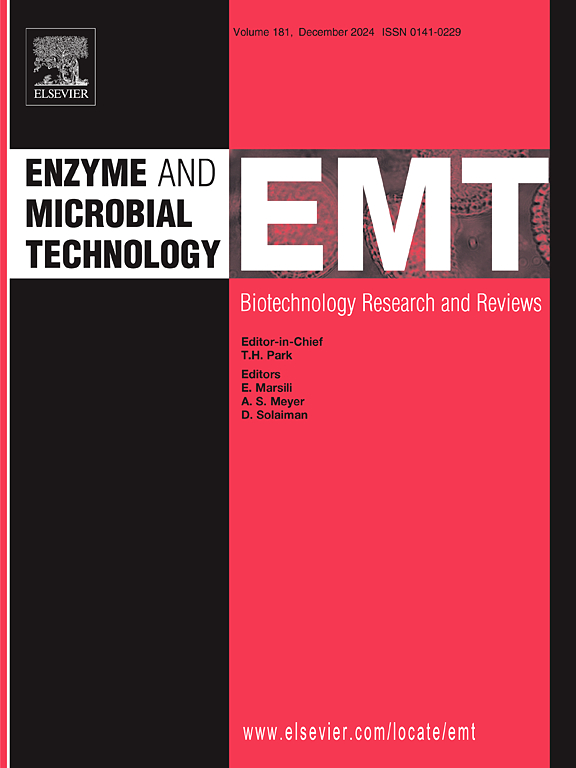Lignin-based monophenolic model compounds in L-tyrosine derivative synthesis via tyrosine phenol lyase
IF 3.4
3区 生物学
Q2 BIOTECHNOLOGY & APPLIED MICROBIOLOGY
引用次数: 0
Abstract
Tyrosine phenol lyase (TPL) synthesises L-tyrosine derivatives from monophenols, pyruvate and ammonia. Production of such high-value aromatic chemicals from biomass-derived raw materials is of great interest. In this study, six monophenols (guaiacol, phenol, o-cresol, m-cresol, catechol and syringol) were chosen based on the structure of lignin and were studied as substrates in the enzymatic reaction. Single monophenol reactions (SMR) and binary monophenol reactions (BMR) with guaiacol were carried out. TPL-M379V was found to be selective towards guaiacol (84.5 % conv.). The highest single activity was measured towards phenol (93.9 % conv.). However, the enzyme preferred guaiacol over phenol in the BMRs. Syringol was found to be inert in the reaction, whereas catechol had an inhibitory effect on the enzymatic reaction, in addition to causing degradation of all the substrates in the medium. Doubling the guaiacol concentration in the SMR did not significantly increase the production of 3-O-methyldopa (conv. 45.9 %). However, in the binary reaction systems the total monophenol conversions were higher with guaiacol and phenol (total 62.4 %) or o-cresol (total 57.1 %). This indicates possible substrate/product specific inhibition. The study provides new data on activity, selectivity and inhibitory effects of monophenols in the synthetic reaction catalysed by TPL-M379V, especially in mixed-substrate reactions.
通过酪氨酸苯酚裂解酶合成 L-酪氨酸衍生物中以木质素为基础的单酚模型化合物。
酪氨酸酚裂解酶(TPL)可从单酚、丙酮酸和氨中合成 L-酪氨酸衍生物。从生物质衍生原料中生产此类高价值芳香化学品具有重大意义。本研究根据木质素的结构选择了六种单酚(愈创木酚、苯酚、邻甲酚、间甲酚、儿茶酚和丁香酚)作为酶反应的底物进行研究。进行了与愈创木酚的单酚反应(SMR)和二元单酚反应(BMR)。研究发现,TPL-M379V 对愈创木酚具有选择性(84.5% 的转化率)。测得对苯酚的单一活性最高(93.9 % conv.)。然而,在 BMRs 中,该酶偏好愈创木酚而非苯酚。在反应中发现丁香酚是惰性的,而儿茶酚除了会导致培养基中所有底物的降解外,还会对酶反应产生抑制作用。将 SMR 中愈创木酚的浓度增加一倍并不能显著提高 3-O-甲基多巴的产量(conv. 45.9 %)。不过,在二元反应体系中,愈创木酚和苯酚(总转化率 62.4%)或邻甲酚(总转化率 57.1%)的单酚总转化率更高。这表明可能存在底物/产物特异性抑制。这项研究为 TPL-M379V 催化合成反应,特别是混合底物反应中单苯酚的活性、选择性和抑制作用提供了新的数据。
本文章由计算机程序翻译,如有差异,请以英文原文为准。
求助全文
约1分钟内获得全文
求助全文
来源期刊

Enzyme and Microbial Technology
生物-生物工程与应用微生物
CiteScore
7.60
自引率
5.90%
发文量
142
审稿时长
38 days
期刊介绍:
Enzyme and Microbial Technology is an international, peer-reviewed journal publishing original research and reviews, of biotechnological significance and novelty, on basic and applied aspects of the science and technology of processes involving the use of enzymes, micro-organisms, animal cells and plant cells.
We especially encourage submissions on:
Biocatalysis and the use of Directed Evolution in Synthetic Biology and Biotechnology
Biotechnological Production of New Bioactive Molecules, Biomaterials, Biopharmaceuticals, and Biofuels
New Imaging Techniques and Biosensors, especially as applicable to Healthcare and Systems Biology
New Biotechnological Approaches in Genomics, Proteomics and Metabolomics
Metabolic Engineering, Biomolecular Engineering and Nanobiotechnology
Manuscripts which report isolation, purification, immobilization or utilization of organisms or enzymes which are already well-described in the literature are not suitable for publication in EMT, unless their primary purpose is to report significant new findings or approaches which are of broad biotechnological importance. Similarly, manuscripts which report optimization studies on well-established processes are inappropriate. EMT does not accept papers dealing with mathematical modeling unless they report significant, new experimental data.
 求助内容:
求助内容: 应助结果提醒方式:
应助结果提醒方式:


